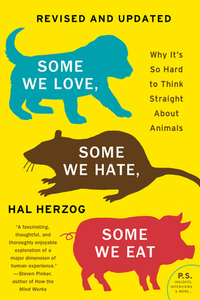Take a photo of a barcode or cover
172 reviews for:
Some We Love, Some We Hate, Some We Eat: Why It's So Hard to Think Straight About Animals
Hal Herzog
172 reviews for:
Some We Love, Some We Hate, Some We Eat: Why It's So Hard to Think Straight About Animals
Hal Herzog
This book almost ended up on my DNF list but I'm glad I stuck with it. The earlier part of the book contains way too much oversimplification, and I'd say the only worthwhile part of the first third is the confrontation of the idea that childhood cruelty to animals predicts adult violent tendencies. The latter two thirds of the book, though, really dove into the interesting questions and gave me a lot of really interesting material to wrestle with.
This book takes a thought-provoking look at our contradictory, and often hypocritical, attitude toward animals. From vegans and animal sanctuary directors to cock fighters and researchers using animals for experiments, Hal Herzog examines the complex web of animal exploitation and the fight for animal rights. Unfortunately, while Herzog opens the door for debate and thought, he never closes it. While the cover claims the book will explain "why it's so hard to think straight about animals," it doesn't ever answer the "why." The book does pose some interesting ethical questions for consideration. Herzog points out that chickens raised for food are treated much more cruelly than roosters raised for cock fighting, yet Americans tend to embrace the former and reject the latter. I believe he chooses not to lay out a moral for us because he is still struggling with these issues himself. He admits that the factory farm industry treats animals with cruelty, but he still eats meat. The book definitely made me think, but it didn't answer any questions for me; if anything, it posed even more.
Update: So I decided to rate this 4 out of 5 for the time being just because I think it had an impact on me and I enjoyed it.
I don't know how people rate non-fiction so, for now, I am just going to abstain from doing so.
I am majoring in Animal Studies with a minor in Biology. So as you can probably guess I love and have an interest in animals and when I graduate I want to either be an animal behaviorist or I want to work with rehabilitating abused or neglected animals that need to be socialized and saved from being euthanized.
With that being said yes I bought this book for a class. But we only had to read a couple of chapters. I, however, wound up reading the whole thing because I seriously found everything in this book fairly interesting. Yes, there were some chapters that didn't hook me as strongly as others but overall it was enjoyable.
I feel more confused about my stances on certain subject matter throughout the book.
Oh also forgot to say that this book is basically a psychological stance or perspective on the human and animal relationship and all the complexities of this relationship and the dynamics as well. It really goes in depth and analyses every side of the arguments or problems that were posed. It made for something that really made me question some of my views on the animal and human relationship and my own stances.
I thought I would not like this book purely based on it being non-fiction but it deals with two subjects I enjoy: Animals & Psychology.
To put it simply I enjoyed this book so much.
I don't know how people rate non-fiction so, for now, I am just going to abstain from doing so.
I am majoring in Animal Studies with a minor in Biology. So as you can probably guess I love and have an interest in animals and when I graduate I want to either be an animal behaviorist or I want to work with rehabilitating abused or neglected animals that need to be socialized and saved from being euthanized.
With that being said yes I bought this book for a class. But we only had to read a couple of chapters. I, however, wound up reading the whole thing because I seriously found everything in this book fairly interesting. Yes, there were some chapters that didn't hook me as strongly as others but overall it was enjoyable.
I feel more confused about my stances on certain subject matter throughout the book.
Oh also forgot to say that this book is basically a psychological stance or perspective on the human and animal relationship and all the complexities of this relationship and the dynamics as well. It really goes in depth and analyses every side of the arguments or problems that were posed. It made for something that really made me question some of my views on the animal and human relationship and my own stances.
I thought I would not like this book purely based on it being non-fiction but it deals with two subjects I enjoy: Animals & Psychology.
To put it simply I enjoyed this book so much.
I really enjoyed this book. It was a look into the weird relationship people have with animals. The chapter on cock fighting vs. the life of broiler chickens was particularly interesting. One thing I really liked is that the author did a really good job of presenting different sides of issues such as animals used for experiments, he would also give some of his thoughts and opinions on the various subjects, but I didn't find his opinions to be overbearing and preachy. I highly recommend this to anyone curious about people's odd relationship with animals and those interested in social/cultural studies.
i didn't agree with all of his arguments or opinions but really interesting and an easy read.
Really interesting summary of many of the findings of the relatively new field of animal-human interactions. Why are some of our animals pets, some anathema, and some dinner? Very interesting, many things I'd never thought of. Herzog gives a fair amount of pages to the idea that we are nearly all hypocrites--most of us SAY animals have importance to us, but then most of us progress to eat, wear, and use animals as we please anyway. I don't know that I agree with all of Herzog's conclusions, especially since I am coming from a Christian worldview and not an atheistic one, but still very interesting stuff.
"Save the Sea Kittens!"
"Eat the Whales!"
"We are all hypocrites, and in our condemnation of others' hypocrisy we only compound our own."
"Eat the Whales!"
"We are all hypocrites, and in our condemnation of others' hypocrisy we only compound our own."
this left me feeling both immensely morally superior and like an ignorant failure and you know what I liked it
This was pretty good, but could have been better. The title really does sum up what it's about, and the conclusion really is just that it's really complicated. People feel differently about different species of animals around the world. I don't think all of humanity will ever really agree on it.
There were, however, some interesting topics, and I think a lot of people would benefit from reading this, even if all it does is open up minds about the discussion of humans' relationships with animals and how pervasive it is in human culture.
I want to look further into the discussion of how a Linda the author spoke to researches and thinks that animal exploitation is intimately tied to the oppression of women, minorities, and people of color. I listened to the audiobook, so I'll have to do some digging to find more writing on this.
Also, the discussion between research subject and pest was illuminating, and I think people would have their eyes opened to how animals are treated in both of these situations.
I will be checking out [b:Why We Love Dogs, Eat Pigs, and Wear Cows: An Introduction to Carnism: The Belief System That Enables Us to Eat Some Animals and Not Others|6532109|Why We Love Dogs, Eat Pigs, and Wear Cows An Introduction to Carnism The Belief System That Enables Us to Eat Some Animals and Not Others|Melanie Joy|https://images.gr-assets.com/books/1312313476s/6532109.jpg|6724218] soon, as I gather from reviews of both books that this might be better researched and draw better conclusions/actually have suggestions on how to approach the topic and try to do something about how poorly animals are treated in our (at least Western) culture.
There were, however, some interesting topics, and I think a lot of people would benefit from reading this, even if all it does is open up minds about the discussion of humans' relationships with animals and how pervasive it is in human culture.
I want to look further into the discussion of how a Linda the author spoke to researches and thinks that animal exploitation is intimately tied to the oppression of women, minorities, and people of color. I listened to the audiobook, so I'll have to do some digging to find more writing on this.
Also, the discussion between research subject and pest was illuminating, and I think people would have their eyes opened to how animals are treated in both of these situations.
I will be checking out [b:Why We Love Dogs, Eat Pigs, and Wear Cows: An Introduction to Carnism: The Belief System That Enables Us to Eat Some Animals and Not Others|6532109|Why We Love Dogs, Eat Pigs, and Wear Cows An Introduction to Carnism The Belief System That Enables Us to Eat Some Animals and Not Others|Melanie Joy|https://images.gr-assets.com/books/1312313476s/6532109.jpg|6724218] soon, as I gather from reviews of both books that this might be better researched and draw better conclusions/actually have suggestions on how to approach the topic and try to do something about how poorly animals are treated in our (at least Western) culture.



